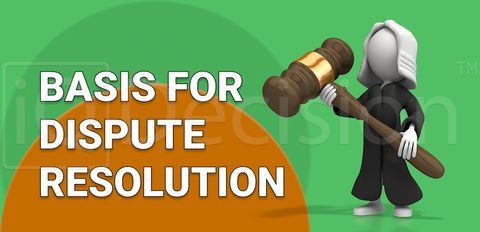Formal procedures involving resolution of an international financial dispute may be rather costly & require a lot of time. They can also distract the company from its main business activities & lead to the draining of its resources. Therefore, prior to initiating a full-fledged trial, parties involved in a dispute are strongly recommended to resolve their differences without resorting to litigation.
Normally, most disputes are resolved without a court or arbitration decision, with parties reaching a compromise through negotiation. However, reaching a real compromise during dispute resolution isn’t all that it takes to resolve an international dispute.
So, let's see what it takes to effectively resolve disputes in one’s own country & abroad.
Dispute Resolution Explained
First, let’s take care of the definition. Basically, dispute resolution is a process that ends in an agreement being reached. This means that parties come up with a compromise solution which enables them to resolve their differences.
It can be concluded orally & doesn’t necessarily have to be in written form. However, getting it in writing helps prevent any disagreements regarding the terms of dispute resolution.
Resolving a Dispute
A commercial dispute can be resolved at its initial stage, before the trial, or a lot later, by decision of the same court.
Quite a few commercial agreements have special provisions providing for resolution of potential disputes & requiring parties to conduct negotiations at early stages to avoid going to court or resorting to arbitration. In some contracts, such provisions describe in detail the necessary procedures & provide for settling disputes through mediation.
Still, there’s a risk that a dispute may not be resolved through negotiations & parties will have to go to court. However, the timely involvement of a competent mediator minimizes this risk, and, most often, helps settle disputes to the mutual satisfaction of both parties.
Dispute Settlement - Oral or Written Form?
There are no specific requirements for documenting dispute settlement agreements. However, doing so will help prevent new disputes from arising in the future. Documenting can be done through email correspondence but an agreement in writing will take precedence over a verbal one or a simple email.
What an Agreement on Dispute Resolution Should Contain
The main factor in dispute resolution is a monetary compensation whereby one of the parties pays a certain amount of money to another party. However, such a compensation is but a first step toward reaching a full-fledged deal. There are other things to be kept in mind here, such as:
- Refund. That’s anything given in exchange for the settlement of a claim. In most cases, this is cash; however, it can sometimes involve assets or services & goods at reduced prices.
- The right choice of parties. If one party has a multi-tier structure and represents, let’s say, a holding, then resolving a financial dispute may prove to be a challenge for other parties. This means that one needs to make sure that dispute resolution will take place under predictable conditions.
- Subject of dispute resolution. Determining the exact nature of settlement & making sure that the dispute and its reason are clearly defined in the contract is absolutely important.
Other ptions that should be kept in mind here are as follows:
- specific claims;
- claims stemming from facts underlying a dispute;
- claims stemming from a specific contract;
- claims arising in connection with the relations of the parties;
- scope of settlement (potential claims can be annulled by signing an agreement on settling claims that didn't arise yet);
- confidentiality (often, the parties prefer that the details of resolving international financial disputes through mediation remain confidential; however, the parties should sometimes be careful of what information they will make publicly available);
- expenses (typically, an agreement states that both parties are responsible for all agreement-related expenses; however, the question of how these obligations will be honored should be addressed as well);
- taxes (when making certain payments, you should also pay attention to taxes).
Also, an agreement on resolving an international dispute may contain a provision regarding the manner in which parties will cooperate to handle any existing litigation.
End of a Trial
Once an agreement on dispute resolution is signed, a trial may end in 3 ways:
- Termination. A claim is withdrawn by the plaintiff.
- Dissolution. A request to terminate the proceedings is made by the parties.
- Suspension. Proceedings can be suspended until either party files a request with the court to cancel the suspension.
Need legal assistance with resolving disputes through mediation? IQ Decision UK can provide you with legal advice on mediation services in the UK and other countries. For more information, please contact us by filling out the application form below.


















